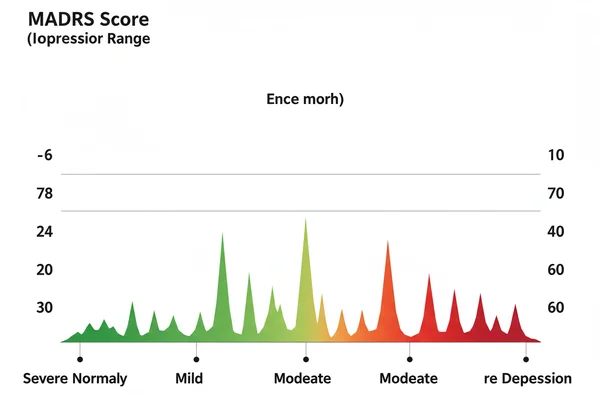Ihre MADRS-Ergebnisse besprechen: Arzt & Angehörige
Die Reise durch Ihre psychische Gesundheit ist ein zutiefst persönlicher Prozess, und ein Schritt wie das Ausfüllen einer Montgomery-Åsberg Depression Rating Scale (MADRS) ist ein bedeutender Akt der Selbsterkenntnis. Sie haben den Test gemacht, Sie haben einen Score, und jetzt fragen Sie sich vielleicht, was soll ich mit meinem MADRS-Score tun? Diese Zahl ist mehr als nur Daten; sie ist ein Schlüssel, der bedeutungsvolle Gespräche und einen Weg zur Unterstützung eröffnen kann. Dieser Leitfaden soll Ihnen einfühlsame, praktische Schritte aufzeigen, wie Sie Ihre MADRS-Ergebnisse sowohl mit Ihrem Arzt als auch mit Ihren Angehörigen souverän besprechen können, um das Unterstützungssystem aufzubauen, das Sie verdienen.
Ihr Score ist ein Ausgangspunkt, eine wertvolle Information, die Ihnen hilft, Ihren aktuellen Zustand zu verstehen. Indem Sie lernen, wie Sie ihn effektiv kommunizieren, befähigen Sie sich, die Kontrolle über Ihre mentale Gesundheitsgeschichte zu übernehmen. Egal, ob Sie sich auf einen klinischen Termin oder ein herzliches Gespräch mit einem Familienmitglied vorbereiten, wir begleiten Sie dabei. Wenn Sie bereit sind, Ihre Reise zu verfolgen, können Sie jederzeit den MADRS-Test machen auf unserer Plattform.

Wie Sie mit Ihrem Arzt über Ihre MADRS-Ergebnisse sprechen
Das Teilen Ihres MADRS-Scores mit einem Gesundheitsfachmann ist eine der wirkungsvollsten Maßnahmen, die Sie ergreifen können. Es verwandelt abstrakte Gefühle in konkrete Daten, die ein Kliniker nutzen kann, um Ihnen zu helfen. Wenn Sie dieses Gespräch vorbereitet und klar angehen, kann dies den entscheidenden Unterschied machen, um die effektive Versorgung zu erhalten, die Sie benötigen.
Vorbereitung auf Ihren Arzttermin
Das Betreten einer Arztpraxis, um über psychische Gesundheit zu sprechen, kann einschüchternd wirken. Eine gute Vorbereitung kann Ängste lindern und sicherstellen, dass Ihr Termin produktiv ist. Nehmen Sie sich vorab einen Moment Zeit, um Ihre Gedanken zu sammeln. Notieren Sie Ihren MADRS-Score und das Datum, an dem Sie den Test gemacht haben. Wenn Sie ihn mehrmals gemacht haben, bringen Sie alle Scores mit, um Trends aufzuzeigen.
Denken Sie über das "Warum" hinter Ihrem Score nach. Notieren Sie neben der Zahl auch ein paar spezifische Beispiele aus der letzten Woche, die veranschaulichen, wie Sie sich gefühlt haben. Anstatt nur zu sagen, Sie fühlen sich "traurig", könnten Sie zum Beispiel erwähnen: "Es fiel mir schwer, beim Hören meiner Lieblingsmusik überhaupt Freude zu empfinden." Dieser Kontext ist für Ihren Arzt von unschätzbarem Wert. Diese Daten helfen Ihnen, sich selbst zu vertreten, und eine konsistente Überwachung ermöglicht es Ihnen, Ihren Fortschritt zu verfolgen im Laufe der Zeit, was sowohl Ihnen als auch Ihrem Anbieter ein klareres Bild vermittelt.
Wichtige Punkte, die Sie mit Ihrem Gesundheitsdienstleister teilen sollten
Versuchen Sie während Ihres Termins, direkt und offen zu sein. Beginnen Sie mit etwas wie: „Ich habe die Montgomery-Åsberg Depression Rating Scale online ausgefüllt, um meine Symptome besser zu verstehen, und ich möchte die Ergebnisse gerne mit Ihnen besprechen.“ Dies rahmt das Gespräch sofort ein und zeigt, dass Sie proaktiv an Ihrer Gesundheit beteiligt sind.
Teilen Sie Ihren Score und die spezifischen Symptome, die dazu beigetragen haben. Erwähnen Sie zum Beispiel, wenn Schwierigkeiten mit Schlaf, Appetit oder Konzentration besonders hoch bewertet wurden. Es ist auch hilfreich zu beschreiben, wie sich diese Symptome auf Ihr tägliches Leben auswirken – Ihre Arbeit, Beziehungen und die Fähigkeit, für sich selbst zu sorgen. Der MADRS-Score ist ein klinisches Instrument, und seine Präsentation gegenüber Ihrem Arzt liefert ihm eine standardisierte Metrik, um seine professionelle Bewertung zu untermauern.

Die Interpretation Ihres Arztes und die nächsten Schritte verstehen
Es ist wichtig zu bedenken, dass ein MADRS-Score ein Messinstrument und keine Diagnose ist. Ihr Arzt wird Ihren Score als eine Komponente einer umfassenden Bewertung verwenden. Er wird Ihnen wahrscheinlich detailliertere Fragen zu Ihrer Vorgeschichte, Ihrem Lebensstil und Ihrer allgemeinen Gesundheit stellen, um ein vollständiges Bild zu erhalten. Sehen Sie den Score als den Beginn eines professionellen Dialogs, nicht als dessen Ende.
Hören Sie aufmerksam der Interpretation Ihres Arztes zu. Er wird Ihren Score in einen klinischen Kontext stellen und besprechen, was er für Sie bedeuten könnte. Mögliche nächste Schritte könnten Therapie, Medikamente, Empfehlungen zum Lebensstil oder einfach ein Plan zur fortlaufenden Überwachung sein. Ihre Rolle ist es, Fragen zu stellen und eventuelle Bedenken zu äußern. Dieser kollaborative Ansatz stellt sicher, dass Ihr Behandlungsplan auf Ihre einzigartigen Bedürfnisse zugeschnitten ist und Sie sich sicher fühlen, voranzuschreiten.
Ihre MADRS-Ergebnisse interpretieren und Gespräche über psychische Gesundheit fördern
Ihr MADRS-Score ist nicht nur für klinische Umgebungen gedacht; er kann auch ein Katalysator für den Aufbau eines stärkeren Unterstützungsnetzwerks mit den Menschen sein, die Ihnen wichtig sind. Das Verstehen Ihrer Ergebnisse ist der erste Schritt, und zu lernen, wie man sie teilt, kann Ihre persönlichen Beziehungen verändern und Gefühle der Isolation reduzieren.
Ihren MADRS-Score entschlüsseln: Was die Zahlen bedeuten
Lassen Sie uns zunächst kurz darauf eingehen, was die Zahlen im Allgemeinen bedeuten. Der MADRS wird von 0 bis 60 bewertet, wobei die Scores typischerweise in Schweregrade eingeteilt werden:
- 0-6: Normal / Symptomfrei
- 7-19: Leichte Depression
- 20-34: Moderate Depression
- 35-60: Schwere Depression
Denken Sie daran, dies sind nur allgemeine Richtlinien. Ihr Score ist eine Momentaufnahme Ihrer Symptome zu einem bestimmten Zeitpunkt. Er definiert nicht, wer Sie sind. Um ein nuancierteres Verständnis zu erlangen, sollten Sie ein Tool verwenden, das eine tiefere Analyse bietet. Wenn Sie Ihren Score erhalten auf unserer Website, haben Sie die Möglichkeit, einen KI-gestützten Bericht zu erhalten, der Ihre Ergebnisse aufschlüsselt und Stärken und Herausforderungen hervorhebt, was für Ihre eigene Reflexion unglaublich hilfreich sein kann.

Sich Angehörigen öffnen: Einen Dialog initiieren
Ein Gespräch über psychische Gesundheit mit Familie oder Freunden zu beginnen, erfordert Mut. Wählen Sie eine Person, der Sie vertrauen, und einen Zeitpunkt, an dem Sie beide ungestört und privat sprechen können. Sie brauchen keine große Rede; ein einfacher, ehrlicher Anfang ist oft am effektivsten.
Sie könnten mit etwas beginnen wie: „Ich habe mich in letzter Zeit nicht wie ich selbst gefühlt, und ich habe eine Online-Bewertung gemacht, um meine Gefühle besser in Worte fassen zu können. Wären Sie offen, mit mir darüber zu sprechen?“ Dieser Ansatz ist nicht konfrontativ und lädt sie in Ihre Erfahrung ein. Indem Sie einen Dialog initiieren, schaffen Sie einen Raum für Verletzlichkeit und Verbindung, die für die Heilung unerlässlich sind.
Tipps für unterstützende und respektvolle Gespräche
Sobald das Gespräch begonnen hat, ist es entscheidend, Ihre Bedürfnisse klar zu äußern. Suchen Sie nach Ratschlägen, oder brauchen Sie einfach nur jemanden, der zuhört, ohne zu urteilen? Lassen Sie Ihren Angehörigen wissen. Sie können sagen: „Im Moment wäre es am hilfreichsten, wenn Sie einfach nur zuhören könnten.“
Teilen Sie das, womit Sie sich wohlfühlen. Sie können erklären, was die MADRS-Skala misst und was Ihr Score-Bereich über Ihre aktuellen Schwierigkeiten aussagt. Es könnte auch hilfreich sein, wenn sie die Art der Fragen sehen, die in der Bewertung gestellt werden, um Ihre Erfahrung besser zu verstehen. Sie könnten sie sogar einladen, die Bewertung mit Ihnen anzusehen und ihre eigene Bewertung zu starten, wenn sie neugierig sind. Ziel ist es, Verständnis und Empathie zu fördern und ein unterstützendes Umfeld zu schaffen, in dem Sie sich gesehen und gehört fühlen.

Empowering Your Journey Beyond the MADRS Score
Ihr MADRS-Score ist ein mächtiges Werkzeug, aber er ist nur ein Teil Ihrer Reise. Die wahre Kraft liegt darin, was Sie mit diesen Informationen tun. Indem Sie sich auf Gespräche mit Ihrem Arzt vorbereiten und sich Ihren Angehörigen öffnen, unternehmen Sie proaktive, mutige Schritte in Richtung Wohlbefinden. Diese Diskussionen sind die Brücke zwischen dem Verständnis Ihres mentalen Zustands und dem Erhalt der Unterstützung, die Sie zum Gedeihen benötigen.
Nutzen Sie weiterhin Tools wie den MADRS, um Ihr Wohlbefinden zu überwachen. Die Verfolgung Ihres Scores über die Zeit kann Muster aufdecken, die Wirksamkeit von Behandlungen zeigen und Sie mit Wissen befähigen. Ihre psychische Gesundheit ist dynamisch, und eine zuverlässige Methode zur Messung ist von unschätzbarem Wert. Wir ermutigen Sie, diese Reise der Selbstfindung und Interessenvertretung fortzusetzen. Machen Sie noch heute den nächsten Schritt, um Ihre Ergebnisse zu entdecken und tiefere, personalisierte Einblicke mit unserem einzigartigen KI-Bericht zu gewinnen.
Häufig gestellte Fragen zu MADRS-Scores und Diskussionen
Wie werden MADRS-Scores interpretiert?
MADRS-Scores werden als Maß für die Schwere der Depression interpretiert und sind im Allgemeinen in normale (0-6), leichte (7-19), moderate (20-34) und schwere (35-60) Bereiche unterteilt. Ein Score sollte jedoch immer von einem Gesundheitsfachmann kontextualisiert werden. Für eine detailliertere persönliche Aufschlüsselung bietet unsere Plattform optionale KI-gestützte Einblicke, die erklären, was verschiedene Score-Level für Ihr tägliches Leben bedeuten könnten, und schlagen umsetzbare nächste Schritte vor.
Was ist ein normaler MADRS-Score?
Ein Score zwischen 0 und 6 wird typischerweise als normal angesehen und deutet auf das Fehlen signifikanter depressiver Symptome hin. Es ist wichtig zu bedenken, dass „normal“ von Person zu Person variieren kann und ein einzelner Score nur eine Momentaufnahme ist. Eine regelmäßige Überwachung ist wertvoller, um Ihre persönliche Ausgangsbasis und eventuelle Veränderungen zu verstehen.
Kann ich den MADRS zur Selbsteinschätzung verwenden?
Ja, der MADRS ist ein hervorragendes Instrument zur Selbsteinschätzung und zur Überwachung von Veränderungen Ihrer Symptome im Laufe der Zeit. Die Nutzung unserer Plattform ermöglicht es Ihnen, Ihre Scores konsistent zu verfolgen. Obwohl er für persönliche Einblicke und die Verfolgung der Behandlungswirksamkeit sehr wertvoll ist, ersetzt er keine formale Diagnose durch einen qualifizierten Gesundheitsdienstleister.
Wie genau ist der MADRS?
Der MADRS gilt in klinischen Umgebungen als „Goldstandard“ zur Beurteilung des Schweregrads von Depressionen. Er ist ein hochzuverlässiges und gültiges Instrument, das seit Jahrzehnten in der psychiatrischen Forschung und Praxis eingesetzt wird. Seine Genauigkeit ist am höchsten, wenn er wie vorgesehen verwendet wird: als Werkzeug zur Messung der Symptomstärke und zur Überwachung von Veränderungen, und nicht als eigenständiger diagnostischer Test.